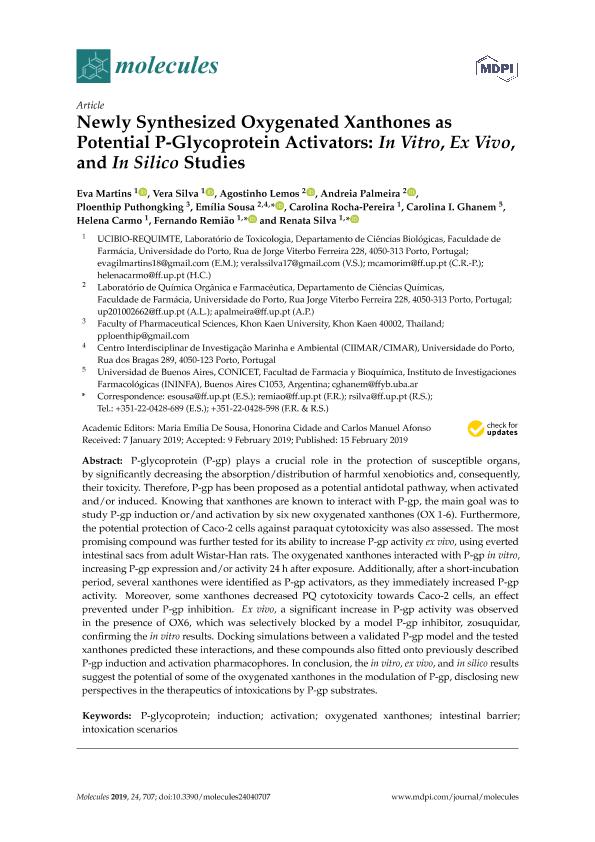Mostrar el registro sencillo del ítem
dc.contributor.author
Martins, Eva
dc.contributor.author
Silva, Vera
dc.contributor.author
Lemos, Agostinho
dc.contributor.author
Palmeira, Andreia
dc.contributor.author
Puthongking, Ploenthip
dc.contributor.author
Sousa, Emília
dc.contributor.author
Rocha-Pereira, Carolina
dc.contributor.author
Ghanem, Carolina Inés

dc.contributor.author
Carmo, Helena
dc.contributor.author
Remião, Fernando
dc.contributor.author
Silva, Renata Alejandra

dc.date.available
2021-06-11T19:14:25Z
dc.date.issued
2019-02-15
dc.identifier.citation
Martins, Eva; Silva, Vera; Lemos, Agostinho; Palmeira, Andreia; Puthongking, Ploenthip; et al.; Newly synthesized oxygenated xanthones as potential P-glycoprotein activators: In vitro, ex vivo, and in silico studies; Multidisciplinary Digital Publishing Institute; Molecules; 24; 4; 15-2-2019; 1-27
dc.identifier.issn
1420-3049
dc.identifier.uri
http://hdl.handle.net/11336/133725
dc.description.abstract
P-glycoprotein (P-gp) plays a crucial role in the protection of susceptible organs, by significantly decreasing the absorption/distribution of harmful xenobiotics and, consequently, their toxicity. Therefore, P-gp has been proposed as a potential antidotal pathway, when activated and/or induced. Knowing that xanthones are known to interact with P-gp, the main goal was to study P-gp induction or/and activation by six new oxygenated xanthones (OX 1-6). Furthermore, the potential protection of Caco-2 cells against paraquat cytotoxicity was also assessed. The most promising compound was further tested for its ability to increase P-gp activity ex vivo, using everted intestinal sacs from adult Wistar-Han rats. The oxygenated xanthones interacted with P-gp in vitro, increasing P-gp expression and/or activity 24 h after exposure. Additionally, after a short-incubation period, several xanthones were identified as P-gp activators, as they immediately increased P-gp activity. Moreover, some xanthones decreased PQ cytotoxicity towards Caco-2 cells, an effect prevented under P-gp inhibition. Ex vivo, a significant increase in P-gp activity was observed in the presence of OX6, which was selectively blocked by a model P-gp inhibitor, zosuquidar, confirming the in vitro results. Docking simulations between a validated P-gp model and the tested xanthones predicted these interactions, and these compounds also fitted onto previously described P-gp induction and activation pharmacophores. In conclusion, the in vitro, ex vivo, and in silico results suggest the potential of some of the oxygenated xanthones in the modulation of P-gp, disclosing new perspectives in the therapeutics of intoxications by P-gp substrates.
dc.format
application/pdf
dc.language.iso
eng
dc.publisher
Multidisciplinary Digital Publishing Institute
dc.rights
info:eu-repo/semantics/openAccess
dc.rights.uri
https://creativecommons.org/licenses/by-nc-sa/2.5/ar/
dc.subject
ACTIVATION
dc.subject
INDUCTION
dc.subject
INTESTINAL BARRIER
dc.subject
INTOXICATION SCENARIOS
dc.subject
OXYGENATED XANTHONES
dc.subject
P-GLYCOPROTEIN
dc.subject.classification
Otras Ciencias de la Salud

dc.subject.classification
Ciencias de la Salud

dc.subject.classification
CIENCIAS MÉDICAS Y DE LA SALUD

dc.title
Newly synthesized oxygenated xanthones as potential P-glycoprotein activators: In vitro, ex vivo, and in silico studies
dc.type
info:eu-repo/semantics/article
dc.type
info:ar-repo/semantics/artículo
dc.type
info:eu-repo/semantics/publishedVersion
dc.date.updated
2020-11-18T17:31:55Z
dc.journal.volume
24
dc.journal.number
4
dc.journal.pagination
1-27
dc.journal.pais
Suiza

dc.journal.ciudad
Basel
dc.description.fil
Fil: Martins, Eva. Universidad de Porto; Portugal
dc.description.fil
Fil: Silva, Vera. Universidad de Porto; Portugal
dc.description.fil
Fil: Lemos, Agostinho. Universidad de Porto; Portugal
dc.description.fil
Fil: Palmeira, Andreia. Universidad de Porto; Portugal
dc.description.fil
Fil: Puthongking, Ploenthip. Khon Kaen University; Tailandia
dc.description.fil
Fil: Sousa, Emília. Universidad de Porto; Portugal
dc.description.fil
Fil: Rocha-Pereira, Carolina. Universidad de Porto; Portugal
dc.description.fil
Fil: Ghanem, Carolina Inés. Consejo Nacional de Investigaciones Científicas y Técnicas. Oficina de Coordinación Administrativa Houssay. Instituto de Investigaciones Farmacológicas. Universidad de Buenos Aires. Facultad de Farmacia y Bioquímica. Instituto de Investigaciones Farmacológicas; Argentina
dc.description.fil
Fil: Carmo, Helena. Universidad de Porto; Portugal
dc.description.fil
Fil: Remião, Fernando. Universidad de Porto; Portugal
dc.description.fil
Fil: Silva, Renata Alejandra. Universidad de Porto; Portugal
dc.journal.title
Molecules

dc.relation.alternativeid
info:eu-repo/semantics/altIdentifier/url/https://www.mdpi.com/1420-3049/24/4/707
dc.relation.alternativeid
info:eu-repo/semantics/altIdentifier/doi/http://dx.doi.org/10.3390/molecules24040707
Archivos asociados
